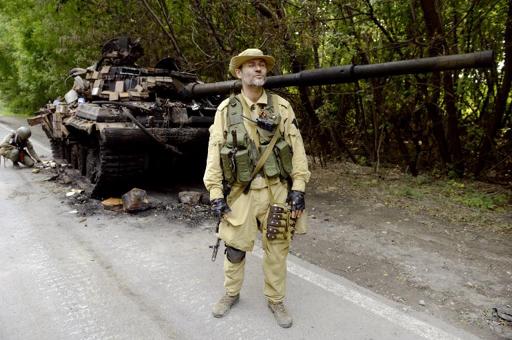Ukrainian President Petro Poroshenko said Wednesday that Russia had withdrawn most of the troops it allegedly sent across the border to back a bloody pro-Kremlin uprising.
His announcement came just as European Union envoys were gathering in Brussels to discuss a new wave of sanctions against Moscow over its role in the conflict in the former Soviet state.
The pro-Western leader also pledged to give separatist regions in Ukraine's eastern industrial heartland more autonomy under a truce deal signed on Friday, but insisted the country would remain unified.
Poroshenko said the ceasefire -- the first backed by both Kiev and Moscow since pro-Russian rebels launched an uprising against Kiev's rule in April -- had dramatically improved the security situation in the war-ravaged region.
"According to the latest information I received from our intelligence headquarters, 70 percent of Russia's forces have been removed," the presidency website quoted Poroshenko as telling his most powerful ministers.
Poroshenko also insisted that "Ukraine will not make any concessions on issues of its territorial integrity" and said a bill he intended to submit to parliament next week granting parts of the east temporary self-rule did mean they were slipping out from under Kiev's control.
"There is and can be no talk of federalisation or some estrangement (by the rebel-held regions)," he said.
Russian President Vladimir Putin had long sought to turn Ukraine into a loose federation in which the eastern industrial rustbelt had the right to establish its own trade and diplomatic relations with Moscow.
And one rebel leader immediately vowed to seek outright independence in what promise to be arduous peace talks aimed at putting a permanent end to the five-month conflict that has killed more than 2,700 people and frayed East-West ties.
"We are not considering remaining part of Ukraine," Donetsk "deputy prime minister" Andrei Purgin told AFP.
Situation radically changed
Poroshenko's announcement of a partial Russian troop withdrawal could affect the discussions of EU diplomats due to decide on Wednesday when to impose new economic sanctions against the Kremlin.
NATO had said last month that Russia had funnelled in at least 1,000 elite troops and heavy weaponry to support pro-Kremlin rebels fighting in eastern Ukraine, dramatically raising the stakes in the conflict.
But Poroshenko said of the pullout: "This gives us hope that there are good prospects for the peace initiative.
"Before the ceasefire was announced, Ukraine was losing the lives of dozens of its heroes on a daily basis," he told the cabinet in nationally televised remarks.
"The situation has radically changed at the front."
The US State Department said on Tuesday it agreed that the truce was "mostly holding".
Some EU members -- wary of further economic reprisals that include a threat to cut off European airlines from crossing Russian airspace -- have insisted that the punitive steps be imposed only on the condition that they may be cancelled quickly if the truce deal holds.
The measures have been ratcheted up in both Brussels and Washington since the July downing of a Malaysian jet liner over rebel-held territory that claimed 298 lives and raised new concerns about Russia's alleged military support for the revolt.
A preliminary report released by Dutch investigators on Tuesday showed that the Boeing 777 was hit by numerous "high-energy objects".
Although the report did not apportion blame, it appears to back claims that MH17 was hit by a missile, after Kiev and the United States charged that it was blown out of the sky by a Russian-supplied ground-to-air missile.
But Russian Defence Minister Sergei Shoigu said Ukraine "bears full responsibility" for the MH17 crash.
The response will come
Details of the new EU sanctions will only be available once they are listed in the EU Official Journal.
"Depending on the situation on the ground, the EU stands ready to review the agreed sanctions in whole or in part," European Council President Herman Van Rompuy said on Monday.
Diplomats say the measures are likely to target Russia's three largest state-held oil companies and several defence corporations.
The steps would prevent giants such as top oil producer Rosneft and the Russian tank maker Uralvagonzavod from taking out any credits European capital markets for longer than 30 days.
The sanctions -- similar to those already imposed by the United States -- threaten to cripple the daily operations of Russia's biggest companies and deal a further setback to an economy whose annual growth is fast approaching zero.
The speaker of Russia's lower house of parliament said EU leaders must realise that Moscow would respond to the new sanctions swiftly and severely.
"As we have honestly warned our partners, the response will definitely come," State Duma speaker Sergei Naryshkin said.






















































